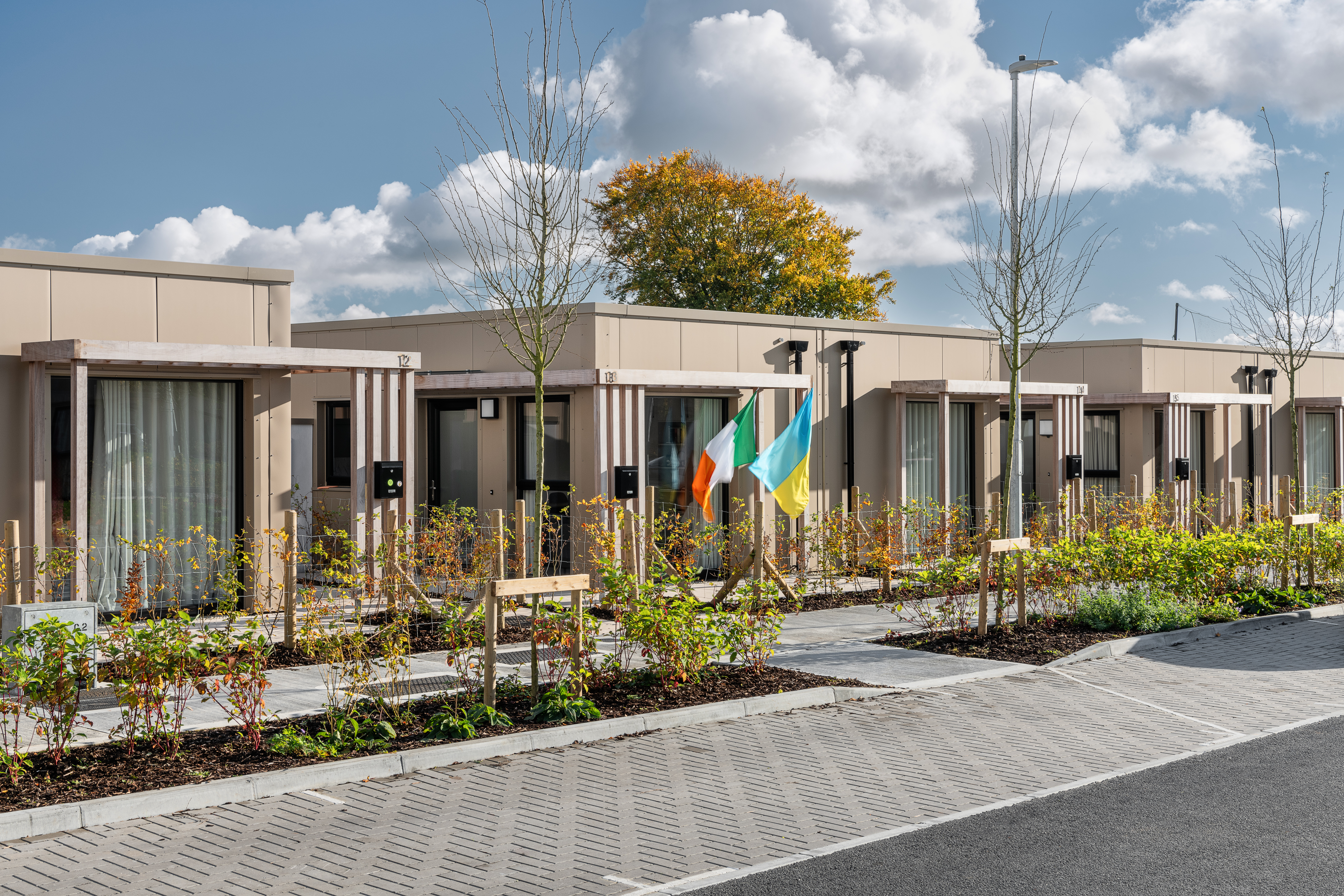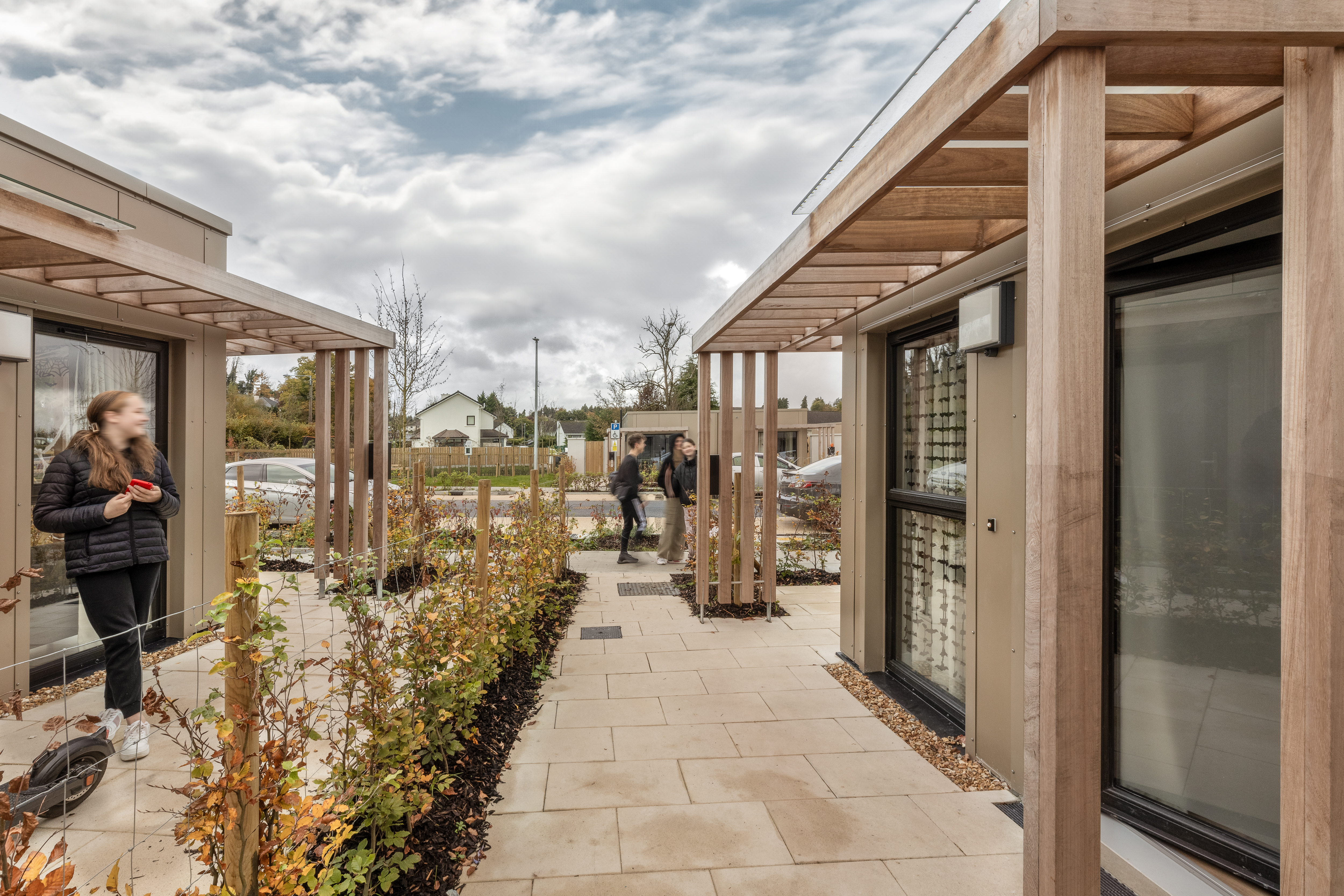All-Ireland Housing Awards winner 2024
Working in partnership
Department of Children, Equality, Disability, Integration and Youth
Office of Public Works, Tuath Housing Association, John Sisk & Son, United Nations Migration Agency (IOM) - Ireland, Depaul Ireland
The war in Ukraine caused ripple effects across the world, with the ongoing conflict claiming the lives of over 10,000, including more than 560 children. According to UNHCR figures, the war's devastating impact led to widespread displacement with 5.1 million people internally displaced and 6.2 million refugees globally. Responding to the crisis, Ireland opened its doors to over 100,000 people displaced by the war in Ukraine, into what is already a challenging accommodation environment.
What did you do?
In March 2022, a rapid build housing program was initiated with the goal of providing short-term accommodation for up to 2,800 individuals in 700 homes, across multiple sites on state owned land. This collaborative initiative, undertaken by the Department of Children, Equality, Disability, Integration and Youth (DCEDIY), the Office of Public Works (OPW), John Sisk & Son, Tuath Housing Association, International Organisation for Immigration (IOM), DePaul Ireland and various contractors, stands as a testament to the power of partnerships in addressing urgent humanitarian needs.
By 2023, 310 homes were successfully completed across seven sites nationally, offering a safe and secure place for 1,240 people who received Beneficiaries of Temporary Protection (BOTP) status. This achievement not only addressed immediate housing needs but also symbolised an ongoing successful, collective effort and commitment to upholding humanitarian values. A further 390 homes are contracted for delivery in 2024.
Led by DCEDIY and the Office of Public Works (OPW), the Rapid Build Homes Programme prioritised the delivery of high-quality, modular homes utilising state owned land and innovative methods of construction to deliver much needed accommodation within existing communities. The developments were completed to an excellent standard and included permanent infrastructure, high-quality public spaces, streets, water, waste, roads, pedestrian routes, lighting, landscaping, semi-private front curtilage and small private rear gardens. This was only possible through working in partnership and realising a common goal of creating supportive living environments for those in dire need.

John Sisk & Son, the construction company overseeing the project, was appointed in 2022 and a framework of five modular homes manufacturers was established. The homes designed by the OPW in consultation with relevant industry representatives, were manufactured to a high energy efficiency standard thus aligning with the OPW’s strategic themes of sustainability and climate action. The homes were well insulated two bedroom modular structures that comply with key building regulations and were designed for a 60-year lifespan. Manufactured off site, they were transported and installed efficiently, minimising environmental impact.
Tuath Housing was appointed to oversee the tenancy and property management of the developments; and to provide assistance to the BOTPs with any concerns in their home. A specific Ukrainian accommodation team was established within Tuath. Recognising the psychological trauma experienced by many beneficiaries, the partnership with DePaul Ireland ensured trauma informed care for individuals, couples and families who may have struggled to adjust to their new surroundings.

A policy for allocating the homes was developed by DCEDIY who commissioned the UN agency, the International Organization for Migration (IOM) to allocate the properties to families based on this policy. BOTPs living in the homes were required to pay a contribution. To ensure a fair charging mechanism and to avoid pushing BOTPs into poverty, a differential contribution scheme was developed by DCEDIY with a flat rate utility charge which covered electricity, heating, water, internet and domestic waste collection.
A comprehensive communication and community engagement strategy was developed for each of the sites, with a focus on briefing local representatives and communities on the roll out of the build programme in their area. DCEDIY also worked with other government departments and agencies to ensure that all additional required resources (such as education and healthcare) were in place. Tuath, together with DePaul, also worked to ensure that the BOTP were supported to integrate within the community, including providing access and signposting to additional supports, such as after-school care and language classes.
What were the outcomes?
By the end of 2023, the project successfully completed 310 high-quality, well insulated two bedroom modular homes across multiple sites, providing safe and secure accommodation for 1,240 individuals who received Beneficiaries of Temporary Protection (BOTP) status.
This pioneering project, the first of its kind, served as a blueprint for future developments. Each phase has presented unique challenges, but the lessons learned will guide future initiatives, fostering a legacy of compassion, resilience and effective collaboration. The collective response to the Ukrainian crisis exemplifies the strength and efficacy of partnerships, standing united in the commitment to addressing immediate needs and creating a sustainable model for future humanitarian efforts.



